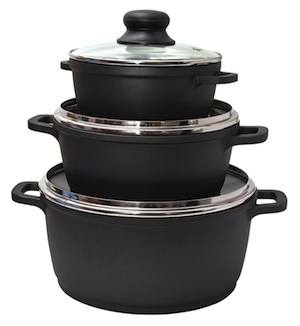We hear a lot about the importance of eating food that’s organically grown and free of pesticides and other harmful toxins. That’s often where the conversation stops. However, should we also give consideration to the cookware we use to prepare the food we eat? Of course nobody wants to eat food with a high aluminum content, but what about preparing food in aluminum cookware? Does that present safety concerns? What about stainless steel cookware? Much research indicates that we need to be as deliberate in the cookware we use as we are in the foods we consume.

The Dangers of Aluminum Cookware
Exposure to, or ingestion of, aluminum can negatively affect the nervous and skeletal system; it’s even thought to be linked to Alzheimer’s disease. [1] Despite this, foods are commonly stored or prepared in aluminum containers which present leaching dangers. This is especially true with acidic and salty foods; citric acid in particular is known to leach aluminum from cookware. [2]
Coffee is not generally known to contain aluminum naturally but when researchers at the Department of Agroenvironmental Chemistry and Plant Nutrition at Czech University of Life Sciences in Prague brewed coffee in aluminum containers, they discovered it to produce detectable levels of aluminum in the coffee. [3]

It’s also important to note that sometimes foods may be prepared in aluminum containers before it even reaches you. The Department of Food Hygiene and Control at Egypt’s Mansoura University found levels of aluminum in milk stored in aluminum containers (likely at the production level). [4]
Boiling water in aluminum cookware prior to use will greatly decrease the amount of aluminum leached, but the best choice is to simply avoid aluminum cookware altogether. [5]
The Dangers of Stainless Steel Cookware
Stainless steel is used in home and commercial cookware but, like aluminum, stainless is readily attacked by acids, particularly at cooking temperatures, and its components can be released into food. The Division of Science, Engineering and Technology at Pennsylvania State found that stainless utensils exposed to even mildly acidic conditions at boiling temperature caused nickel, chromium, and iron corrosion. [6] Research conducted at Texas Tech University College of Human Sciences concluded with similar determinations. [7]
Although it does not completely solve the problem, the Hôpital Edouard Herriot in France recommends that individuals with nickel sensitivity should use nickel-free stainless steel. [8]
The Dangers of Non Stick Cookware
Perhaps one of the most common types of cookware is that which is non-stick. If you’ve ever used sub-par cookware, you probably know how easy it is for some cooking surfaces to cause burnt food to lock on with cement-like attachment. This is a pain to clean up and it ruins the food. Non-stick cookware is designed to prevent this problem, but it also introduces new safety concerns. Read more
No comments:
Post a Comment